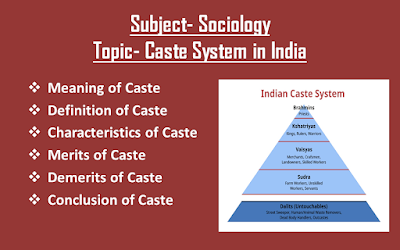Social Class- Meaning, Definition, Characteristics and Conclusion
# Meaning of Social Class
Social class also known as class. Class is a large group of people who rank close to one another in terms of wealth, power and prestige.
Class is a group of people within a society who possess the same social economic status.
Class is a group of people of similar status, rank, common characteristics and similar levels of power and wealth.
Status in class system is acquired and achieved.
Karl Marx defined class on the basis of consciousness.
# Definition of Social Class
1. According to Giddens:- “A class is a large scale grouping of people who share common economic resources, which is strongly influenced the type of lifestyle they are able to lead.”
2. According to Ginsberg:- “A class is a group of individuals who through common descent, the similarity of occupation, wealth and education have come to have a similar stock of ideas, feeling, attitudes and forms of behaviors.”
3. According to Karl Marx:- “A social class as all those people who share a common relationship to the means of economic production.”
4. According to MacIver:- “A social class is any portion of the community marked off from the rest of the social classes.”
5. According to Horton & Hunt:- “A social class is defined as a stratum of people of a similar position in the social status continuum.”
6. According to Ogburn & Nimkoff:- “A social class is the aggregate of persons having essentially the same social status in a given society.”
# Characteristics of Social Class
1. Class is a status group:- Class is related to status. Mostly, status of people depends on wealth and power of the individual. Status is associated with prestige.
2. Hierarchy of social group:- It is a system of hierarchy of the status group. In general, there are three classes- the upper, middle and lower classes in the society.
3. It is an economic group:- The basis of social class is mostly economic.
4. Social ranking:- It is a system of social ranking based on occupation, wealth, education, age and sex.
5. Feeling of superiority and inferiority:- It is a system based on the recognition of superiority and inferiority about those who stand or are below the social hierarchy. Upper and lower classes are considered as superior and inferior respectively.
6. It is an element of prestige:- Each social class has its own status in society, status is associated with prestige.
7. Unequal distribution:- It is a system marked by unequal distribution of wealth and power between classes.
8. It is open group:- Social class is an open class that means vertical mobility is possible.
9. Status is achieved:- A system in which status is achieved by one’s own efforts rather than ascribed assigned or inherited.
10. Social class is different from other classes:- A social class is different from other classes by its lifestyles. Lifestyles includes modes of dress, the kind of houses and neighbors in live in, the cultural products one enjoys, the kind of books, magazines, one’s way of spending money and so on.
# Conclusion
Now, we can conclude that social class is an old concept that determines the social stratification exiting in a society on the basis of economic position, social status and educational qualification. Wealth, power, education and prestige are the key factors in terms of social classes. Classes exert a strong impact on life chances and achieving goals: for instance, the middle-class background gives favorable opportunities and demands careful planning of one’s resources management. In today’s world social class stratification relies on the common three stratum model which divides society into three distinct sections- upper class, middle class and lower class.
Watch video on YouTube





